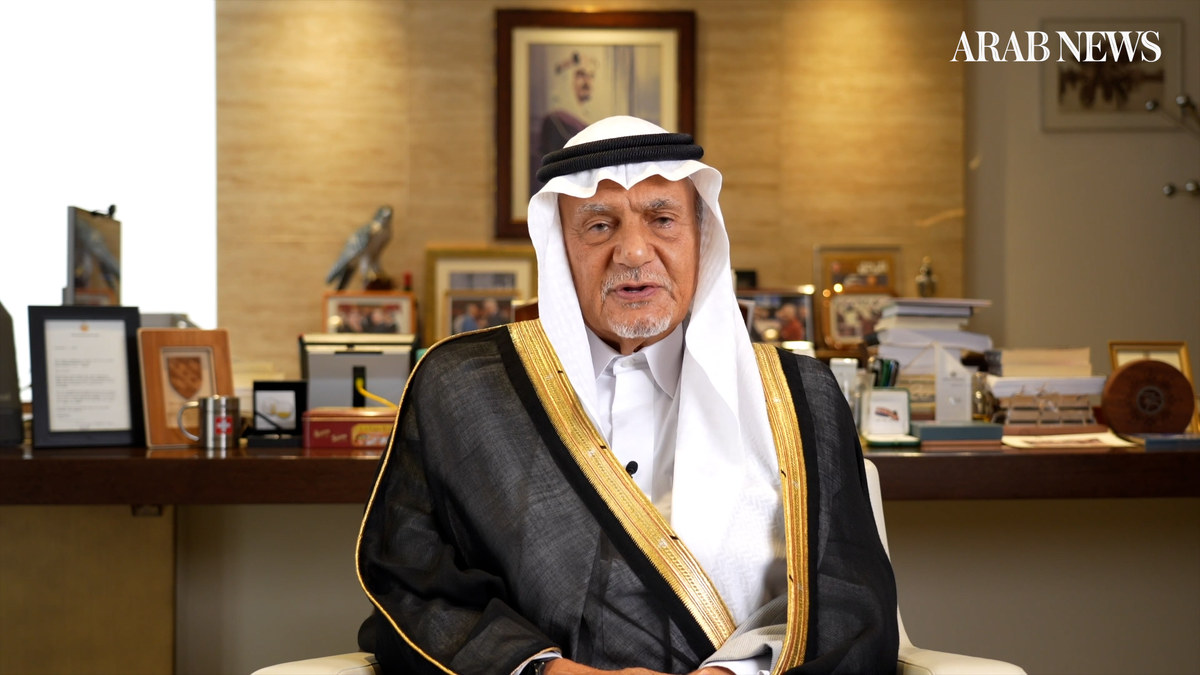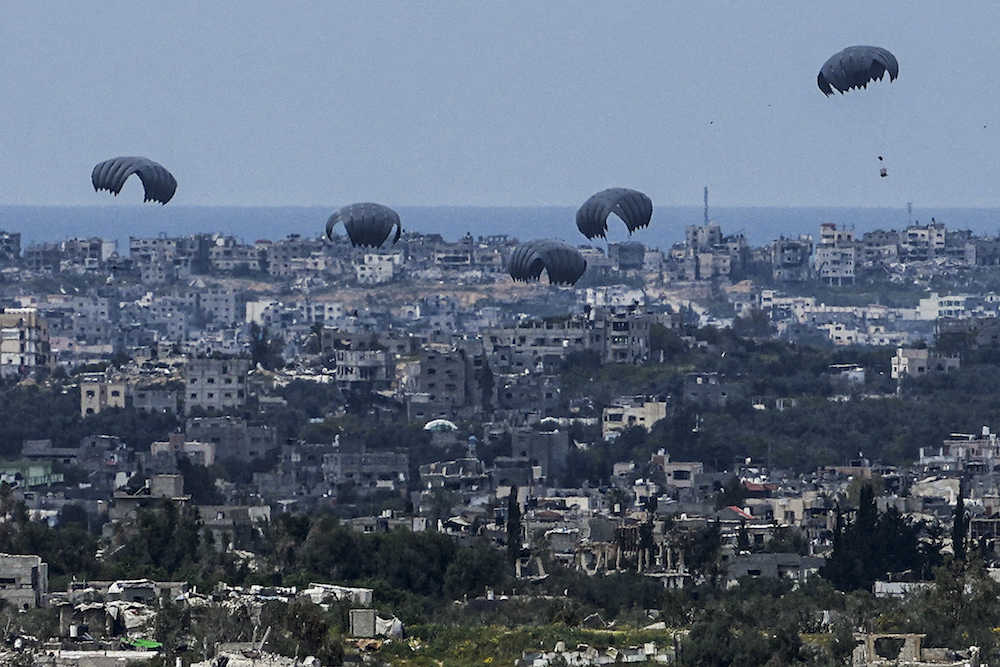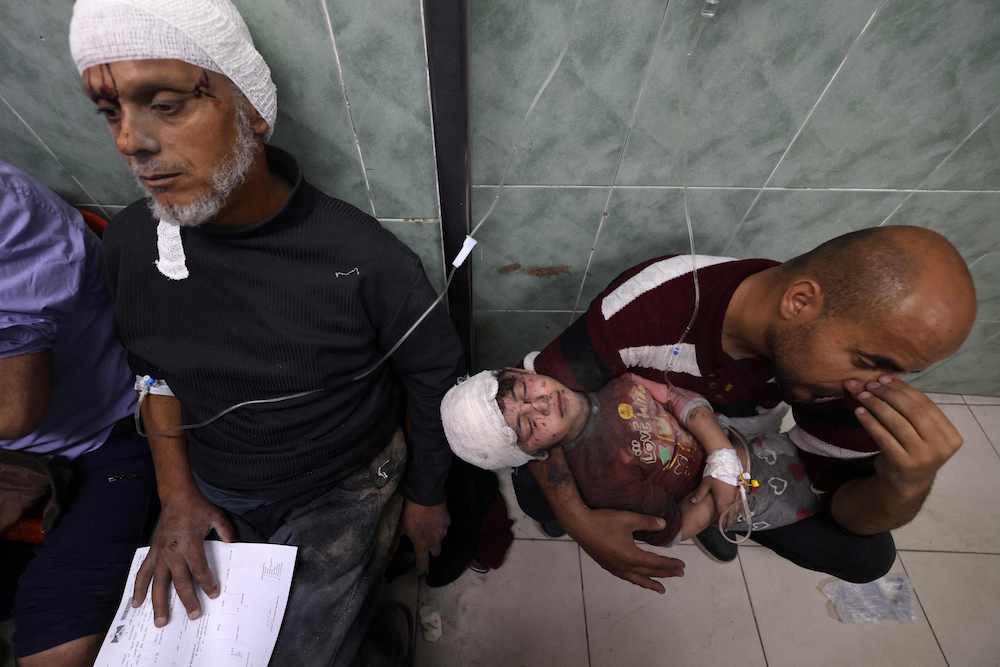DUBAI: Saudi Arabia is using its leverage to help bring an end to the conflict in Gaza but stands by its original position that normalization with Israel will not occur without the establishment of a Palestinian state, according to former Saudi intelligence chief Prince Turki Al-Faisal.
Appearing on “Frankly Speaking,” the weekly Arab News current affairs podcast, he said the Kingdom has a role to play in brokering peace.
“Saudi Arabia is trying to do that to its best ability,” Prince Turki said. “The summit conferences that were held in the Kingdom since the beginning of this conflict indicate that Saudi Arabia very much wants to establish peace and security for everybody and not just for the Israelis.”
Just days before the Oct. 7 Hamas-led attack on Israel that triggered the latest round of bloodletting in Gaza, Saudi Arabia and Israel had appeared to be on the brink of a historic normalization deal brokered by the US.
However, the outbreak of war in Gaza, which has resulted in more than 30,000 Palestinian deaths, according to local health authorities, seems to have killed that process and further set back the Middle East peace process.
Prince Turki said the terms of such an agreement remain the same regardless — that Saudi Arabia would only normalize ties with Israel once the two-state solution had been implemented, granting the Palestinians an independent state.
“What I’ve seen from statements from Saudi officials, from the crown prince and from our foreign minister is that so-called normalization of Israel, if it were to happen, will not happen before the establishment of a Palestinian state with all of the necessary arrangements for that state to be viable and survivable,” he said.
“That has been the official position of Saudi Arabia from the beginning.
“Saudi Arabia has reiterated its commitment to the Arab Peace Initiative as the only viable way to achieve total peace between Israel and the Arab world.”

Former intelligence chief Prince Turki Al-Faisal told Katie Jensen he believes a Saudi-Israeli normalization deal would not happen until the establishment of a Palestinian state. (AN Photo)
Prince Turki added: “The Palestinians are the main victims of the Israeli occupation of Palestine. And achieving their rights and giving them their ability to have their own state and identity has been the main aim of not just Saudi Arabia, but (of) the Arab world in general and the Muslim world in more general terms.
“That has been a goal of the Kingdom since the beginning of the conflict many decades ago, and still is.”
If negotiations for a lasting solution to the decades-old Israeli-Palestinian conflict are to make any headway, Prince Turki said the talks would have to be balanced, especially if the Israeli side insists Hamas is excluded from any dialogue.
“In any consideration for peace between the Palestinians and the Israelis, if there are going to be conditions placed on who represents who around the negotiating table, those conditions should be evenly placed on both sides,” he told Katie Jensen, the host of “Frankly Speaking.”
“If they’re going to exclude certain parties from the Palestinian side, like Hamas, for example, because of what it did on Oct. 7, then they should exclude equally Israeli political parties for what they’re doing in Gaza now.
“And on that basis, there should be a fair distribution of blame, if that is the right word for it, or representation for the Palestinians and the Israelis. So, the Israelis are just as culpable and just as vicious as any fighter in Hamas or any of the parties on the Palestinian side.”
Israel’s bombardment of Gaza, coupled with its restrictions on the flow of humanitarian aid and commercial goods permitted to enter the enclave, has resulted in accusations of genocide against the Palestinian people — claims Israel vehemently rejects.
South Africa, long a supporter of the Palestinian cause, brought a case against Israel before the International Court of Justice at The Hague in January accusing it of committing acts of genocide in Gaza.
Asked whether he believes Israel’s military campaign in Gaza amounts to a breach of the genocide convention, Prince Turki said: “I’m not the only one who believes that.
“I think we’ve seen the reaction of the world populations everywhere, the demonstrations that have gone out in the streets of major cities in Europe, in America, in Asia, in Africa, in Latin America.
“Everywhere you go, people have gone out in the streets condemning Israel’s brutal attacks on the Palestinian people in general and more specifically in Gaza.
“And, definitely, the ICJ has already said that there are grounds to believe that Israel is committing genocide in these territories. So, I’m not the only one who believes that.”

Parachutes drop supplies into the northern Gaza Strip, as seen from southern Israel, Sunday, March 24, 2024. (AP)
He added: “The Israelis are just there portraying themselves as innocent bystanders, or victims of Hamas brutality, when they are the ones who are committing the major crimes there. And the ICJ definitely has put its mark on the world to require the end of the hostilities there and the stopping of the carnage that Israel is causing.”
In 2020, the US-brokered normalization deals known as the Abraham Accords between Israel and several Arab states, including the UAE, Bahrain, Morocco and Sudan. The implicit understanding was that Israel would become less aggressive toward Palestinians.
In reality, many prominent Arabs believe there has been little in the way of tangible evidence to suggest that Arab normalization agreements have advanced the cause of peace in the Middle East.
In this sense, have the Abraham Accords failed? “Definitely,” said Prince Turki.
“It is not just a failure of the Abraham Accords, but it’s a failure of the world community since the Israeli occupation of Palestine. It’s more than 75 years since the creation of Israel, and yet we’re still, as it were, walking in place without moving forward on establishing a Palestinian state with Palestinian rights and the necessity of peace between Israel and its neighbors.
“So, I hope that the recent events have convinced the world of the need to walk the walk, not only talk the talk, about establishing peace in the Middle East.”
Meanwhile in Gaza, Israel has continued to accuse Hamas of using civilians as human shields by deliberately digging tunnels under hospitals, schools and places of worship.
Prince Turki, who is an expert in the tactic of guerilla warfare, having written extensively on the topic in relation to the Mujahideen campaign against the Soviet Red Army in Afghanistan, said there is no evidence that Hamas has used these tunnels for anything more than to hide from Israeli attacks.
More interesting still is the origins of these subterranean networks, which were, it seems, built by the Israelis years earlier.
“There is a very interesting interview that the former Prime Minister of Israel Ehud Barak gave to one of the news media in which, out of the blue, he made the observation that it was Israel who first built tunnels in Gaza when they occupied Gaza,” Prince Turki said, referring to an exchange in November last year between Barak and CNN’s Cristiane Amanpour about the bunkers under Al-Shifa Hospital in Gaza City.
“And the interviewer was taken aback and totally surprised and she asked the question again to get Barak to clarify that. And he said, yes, we built them when we were in occupation because it made our occupation easier, and other words to that effect.
“So, building the tunnels was not just Hamas’ idea but the Israelis when they were in occupation used that method as well to further their occupation of Gaza.”
As for Israeli claims that the tunnels have been used by Hamas as command centers, to store weapons, and to conceal hostages, Prince Turki said these were still unproven.

In Gaza, Israel has continued to accuse Hamas of using civilians as human shields by deliberately digging tunnels under hospitals, schools and places of worship. (AFP)
“I have seen no specific evidence of the Israeli claims that these tunnels are used as command headquarters for Hamas,” he said.
“You remember the scenes that they showed at the beginning of this recent fighting of going into one of these tunnels and then claiming that, yes, here is the proof of military use of the tunnels and showing absolutely nothing.
“There has been no evidence other than that the Hamas is using these tunnels, not only for their own protection but also to move from one place to another.”
In fact, far from exposing the barbarity of Hamas, Prince Turki said the Israelis have demonstrated their own disregard for human life with their bombardment of densely populated civilian areas, even though Israeli hostages were likely to be killed in the crossfire.
“The Israelis have not minded killing their own people, civilians as well, in their attempts to meet the challenge of Hamas fighters,” he said.
“There’s been Israeli news media that have covered this aspect of the initial fighting there, that Israel itself is killing their own people in order to kill the Hamas fighters and the kibbutzim that they occupied before the Israeli assault on Gaza itself.
“The Israelis themselves don’t show any concern for human life, even to their own people. Remember the three Israeli hostages that had come out of one of these areas where they were held by the Hamas and they were shot by the Israeli forces.”
The war in Gaza has spilled over into other parts of the region, with exchanges of fire between Israel and Hezbollah on the Lebanese border, assaults on US positions by Iran-backed militias in Iraq and Syria, and attacks on commercial shipping in the Red Sea and Gulf of Aden by Yemen’s Houthi militia.
These Houthi attacks have forced the US to make a screeching U-turn. Having delisted the militia as a terrorist group when it assumed office in 2021, the administration of President Joe Biden has now reimposed the designation and mounted repeated strikes against Houthi positions in Yemen.
“Irony is a good word to describe what has happened in that consideration,” Prince Turki said.
“Having delisted the Houthis from the terrorist list and then working with Saudi Arabia to achieve some kind of ceasefire in Yemen and having succeeded in that, the Palestinian issue impinged on any such considerations, not just for the US, but for us as well.
“And the US has shown that when issues affected it directly, they were willing to take the measures that Saudi Arabia had taken before against the Houthis when they took over in Sanaa. So, it’s a matter of self-preservation, or self-interest on the part of the US that they changed their mind.
“I would not be willing to try to explain or to understand American considerations other than to say that it is very ironic that once having taken that view of the Houthis and delisting them from the terrorist list and now they’re putting them back on it, it’s very much an irony there.”

During his appearance on Frankly Speaking, Prince Turki called out not just the Abraham Accords’ “failure” to bring about peace but also the world community’s role since Israel’s occupation of Palestine. (AN Photo)
And this is not the only U-turn the Biden administration has made in relation to the region.
At the start of his presidency, Biden had promised to make Saudi Arabia a global pariah. Since then, as the war in Ukraine destabilizes global energy prices and Middle East conflicts again dominate the foreign policy agenda, the US has changed its tone.
“I hope that the Americans realize that such brouhaha and hyperbolic positions they take and public statements about pariah status for the Kingdom really should not be practiced by a big power like the US, but rather to look at reality on the ground and see mutual interest and where those should be, rather than wishful thinking on the part of political campaigning in the US,” Prince Turki said.
“We’re coming up to an election in the US in the next few months and I hope both sides will keep that in mind when they’re referring to Saudi Arabia. As you know, the Kingdom in previous elections also had been stigmatized by statements from politicians going back many years.
“But reality subsequently has forced itself on American policymakers and made them recognize that Saudi Arabia is a valuable partner for the US and therefore this is how they should look upon the Kingdom rather than allow party politics to dictate policy in the US.”
Prince Turki would not be drawn on the expected outcome of the presidential election but said that both candidates now recognized the value of Washington’s relationship with Riyadh.
“It’s really a very, very tough contest between two known factors,” he said. “Both Biden and Trump are well known to the American people. All the polling that I see is very much undecided so far. And we’ll just have to wait and see what happens in November of this year.
“My only wish, as I said, is that both sides consider Saudi Arabia as an important partner in maintaining economic welfare for the world, in hoping to achieve peace in our part of the world and going forward for the betterment of mankind, rather than as a political punching bag that either side can feel free to punch every once in a while.”






























